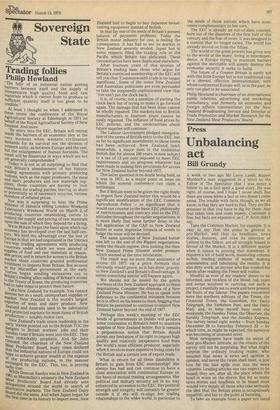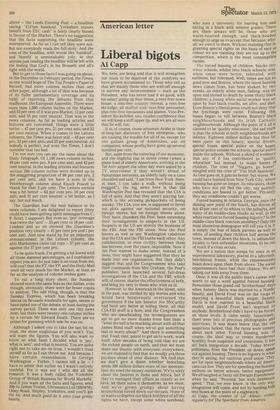Press
Unbalancing act
Bill Grundy
A week or two ago Mr Larry Lamb, Rupert Murdoch's man suggested in a letter to the Editor of The Spectator that I was never a fellow to let a fact spoil a good story. He was right, of course, and I hope I never shall. But there are times when a fact or two doesn't come amiss. The trouble with facts, though, as we all know, is that they are hard to find. They are like potatoes in that you have to dig for them. And that takes time and costs money. Comment is free, but facts are expensive, as C. P. Scott didn't say.
Take the Common Market, for example. It is easy to say that the press in general is pro-Market, and that its headlines, news stories, features, and even its selection of Letters to the Editor, are all strongly biased in favour of the Market. It is a different matter when it comes to proving that statement. It requires a lot of hard work, measuring column inches, reading millions of words, making assessments, and tabulating the results. It is also dirty work, as anyone who has washed his hands after reading the Times will realise.
Mindful as ever of my readers' desire to be informed, and reckless of the blood, toil, tears and sweat involved in carrying out such a project, I manfully set to work and here present the fruits of my labour. The papers concerned were the northern editions of the Times, the Financial Times, the Guardian, the Daily Telegraph, the Yorkshire Post, and the Daily Mail; and, to keep myself busy over the weekends, the Sunday Times, the Observer, the Sunday Telegraph, and the Sunday Express. The survey lasted eight weeks — from Sunday December 29 to Saturday February 22 — by which time, as might be expected, the surveyor was becoming of unsound mind.
Most newspapers have made no secret of their pro-Market attitude, so the results of the survey will not be surprising. But what might surprise the ordinary trusting reader, who assumes that news is news and opinion is opinion, and never the twain shall meet, is just how far the bias spills over into the news columns. Leading articles one can expect to be biased; they are, after all, the place where the heart is worn on the sleeve. But for so many news stories and headlines to be biased must wound very deeply all those who take seriously the idea that the British press is scrupulously impartial, and fair to the point of bursting.
To take an example from a paper not listed
above — the Leeds Evening Post — a headline saying "£1 11/4m handout. Yorkshire miners benefit from EEC cash" is fairly clearly biased in favour of the Market. There's no suggestion that the facts supporting the headline were misreported. As far as I can tell they were not. But not everybody reads the full story. And the tone of the headline, with words like 'handout', and 'benefit' is unmistakably jolly, so that anyone just reading the headline will be left with the feeling that God's in his Brussels and all's right with the world.
But to get to those facts I was going on about. In the December to February period, the Times, as one would hope of The Top People's Paper of Record, had more column inches than any other paper, although a lot of that was because of its fuller parliamentary coverage and its habit of reporting the debates from that madhouse, the European Assembly. There were more than 2,500 column inches on the Market, and 53 per cent of it was pro-Market, 12 per cent anti, and 35 per cent neutral. That was in the news columns. As far as leading articles and features are concerned, things were a little better — 47 per cent pro, 21 per cent anti, and 32 per cent neutral. When it comes to the Letters columns, the Times was fairer still — 45 per cent pro, 32 per cent anti, and 23 per cent neutral. As nobody is perfect, not even the Times, I don't consider that too bad.
I'm not sure you can say the same about the Daily Telegraph. Of 1,100 news column inches, 49 per cent were pro, 9 per cent anti, and 42 per cent neutral. In the leading articles and features section 280 column inches were divided up in the staggering proportion of 98 per cent pro, 2 per cent anti, and we have a note in the Peterborough column about Enoch Powell to thank for that 2 per cent. The Letters section was a bit better — 62 per cent pro, 16 per cent anti, and 31 per cent neutral: a bit better, as I say, but not much.
The Guardian had the best balance in its news columns, I am delighted to report (they could have been getting spirit messages from C. P. Scott, I suppose). But even so, 'pro' coverage was twice the 'anti' — 35 per cent to 16 per cent. Leaders and so on showed the Guardian's position very clearly — 41 per cent pro and 1 per cent anti. And now stand by for an important announcement: in the Letters column, the anti-Marketeers came out tops — 57 per cent as against the 37 per cent pro.
To be quite frank, I'm getting a bit bored with all these damned percentages, as I confidently expect you are. So just take it on trust from me, will you? that the FT, the YP, and the Daily Mail were all very much for the Market, at least as far as the analysis of column inches goes.
To cut a long story short, the Sundays showed much the same bias as the dailies, even though, obviously, there were far fewer copies to analyse. The odd thing, though, is that the Sunday Express, which has been breaking lances on Brussels windmills for ages, seems to have opted out of the debate, at least during the survey period. There was only one tiny news Item, but there were twenty-one column inches by a certain Mr Edward Heath. There are no prizes for guessing which side he was on.
Although I asked you to take the last bit on trust, the more suspicious of you won't. You will want the figures. You will also want to know on what basis I decided what is 'pro', what is 'anti', and what is neutral. You are quite right not to take me on trust. I wouldn't trust myself as far as I can throw me. And because I have certain resemblances to George Washington — Father, I cannot tell a lie — I have to admit that earlier on I wasn't entirely truthful. For it was not I who did all the research. It was a body called the Yorkshire Group of 'British Business for World Markets'. And if you want all the facts and figures, send 20p to James Towler, Ultrasonics Ltd (BBWM), Otley Road, Shipley, Yorkshire, and you'll get the lot. And much good do it unto your gentle hearts.



































 Previous page
Previous page